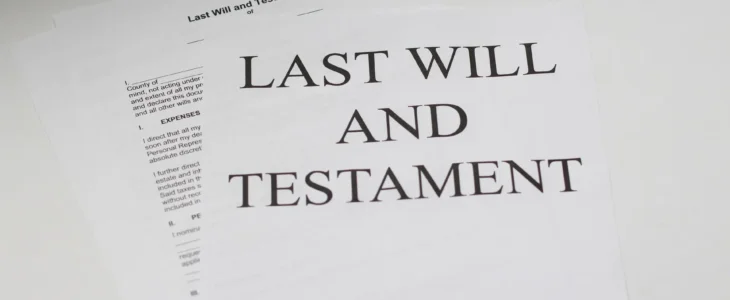Even if your loved one left a last will and testament behind, there may be instances in which it can be challenged. For instance, if your father had dementia and added his second wife’s name to a bank account intended for the family, or your mother changed her last will and testament to omit you in favor of your sibling, you might have grounds to contest a last will and testament.
Another scenario that can lead to challenging a last will and testament is one where a caregiver or “friend” of the decedent ends up getting everything and the family receives nothing. If legal grounds exist to dispute the validity of the last will and testament, a court may treat the estate as if your loved one died intestate [without a last will and testament], reinstate a prior last will and testament, or invalidate the specific portion of the last will and testament that has successfully been contested.
Reasons to Contest a last will and testament
There are several grounds for disputing a last will and testament. If you have a legal interest in your loved one’s estate, you may be entitled to contest their last will and testament if certain circumstances exist. For example, if you were disinherited or believe you should have received a larger portion of the estate than the decedent left you in their last will and testament, you may be able to contest the last will and testament. In some cases, there may be multiple last will and testaments — and the beneficiaries may disagree as to which last will and testament is valid.
The primary reasons a last will and testament might be challenged or contested include the following:
- Incapacity —An individual must be at least 18 years old to make a valid Last Will and Testament. They must also have sufficient mental capacity to create a Last Will and Testament. The law specifies that the creator of the Last Will and Testament must understand they are providing for the disposition of their property after death and the effects of signing the Last Will and Testament. The Last Will and Testament maker must also have the ability to know the extent of their property and the natural objects of their bounty [the usual people in the person’s life that they love and would naturally want to give all their worldy goods at their death].
- Undue Influence — Undue influence means the testator [the person creating the Last Will and Testament] would have had to experience forcible pressure so severe that their free action was compromised. Undue influence can come in the forms of threats, flattery, excessive persuasion, and physical or emotional coercion [fear of being abandoned for not complying]. There is a rebuttable presumption in that undue influence has occurred when the beneficiary was acting as a Power of Attorney or otherwise occupied a position of confidence and trust and had the opportunity to commit undue influence.
- Fraud or misrepresentation — Even competent adults can be tricked into transferring assets or making changes to estate planning documents based on false material statements of fact. When someone relies on a false promise, a misrepresentation, or another type of lie, the Last Will and Testament may be set aside as invalid. Forgery is also a form of fraud that could lead to a Last Will and Testament being invalidated.
- Failure to comply with the legal requirements — In order to have a valid Last Will and Testament, the document must be in writing, signed by the testator, and signed and witnessed by two competent individuals. A handwritten Last Will and Testament may also be recognized if it is dated and signed by the testator, witnesses, and all material portions of the document are in the handwriting of the testator [no cross-outs or corrections can appear on the original final document]. A Last Will and Testament may be set aside if it doesn’t satisfy these legal requirements, although even writings that don’t otherwise satisfy the requirements could qualify as a valid Last Will and Testament if clear and convincing evidence is brought to the Court as evidence of the Testator’s intent when signing the final original document.
- The petitioner has the burden of proof when challenging a Last Will and Testament. In other words, they must raise sufficient evidence to persuade the court that the Last Will and Testament in its current form does not match the decedent’s intent. Notably, even if there is a “no contest clause” in the Last Will and Testament the law states that it will not be enforced if there is probable cause to contest the Last Will and Testament.
Challenging an Account of Convenience
In some cases, older adults or individuals with dementia might set up an “Account of Convenience” as a joint account to allow another person to use the funds in it for the owner’s benefit. These types of accounts are often used for financial management purposes, to pay bills, and run errands. They might also be used as a “poor man’s Last Will and Testament” to help save costs [because the assets will transfer to the co-owner at the death of the individual whose assets were deposited into the Account].
If the owner of the account didn’t mean for the joint owner to keep the assets in it after their passing — and only intended the joint name to be added as a matter of convenience — a court may order that the asset be turned over to the estate. This can also apply to brokerage accounts, stocks, and other financial investments. Importantly, the account must reflect the intent of the person who added the name at the time the account was created, rather than after the fact. The Court will evaluate what evidence is submitted in order to determine the intent of the owner setting up the account.
What is the Legal Process to Contest a Last Will and Testament?
Contesting a Last Will and Testament can be a complex and lengthy legal process — and expensive, but if you have legal standing [the ability of a party to bring a lawsuit in court based upon their stake in the outcome] and can establish grounds that the Last Will and Testament should be rendered invalid, you may be entitled to petition the probate court in the appropriate county. A party who has an interest in the probate proceedings can either object to the Last Will and Testament being probated or dispute the legitimacy of the Last Will and Testament. However, it is essential to understand that you only have a limited amount of time to challenge a Last Will and Testament.
There is no set statute of limitations to challenge a Last Will and Testament if the proceedings are informal, with some exceptions. In the event formal probate proceedings have been commenced, a petitioner must raise their objection before the admission of the Last Will and Testament. Once a formal order of testacy has been entered validating the Last Will and Testament, there is a set appeal period. After this appeal period expires, any challenge to the Last Will and Testament may be barred, absent special circumstances.
Contact an Experienced Probate Attorney
If you have valid grounds to challenge your loved one’s Last Will and Testament, it’s crucial to have a skilled attorney by your side who can assist you with navigating the legal process.

